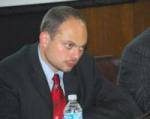
A few hours after a colorful closing ceremony of the Sochi Olympics, which were intended as a showcase for a modern and self-confident Russia, a court in Moscow sentenced a group of opposition activists to prison terms ranging from two to four years. Their "crimes" all involved protesting President Vladimir Putin's inauguration at a rally in Bolotnaya Square in May 2012.
Monday's verdict prompted a street demonstration, which was violently broken up by Russia's special riot police known as the OMON. Hundreds of protesters—according to official figures—were detained and hauled away to police stations. They included opposition leaders Alexei Navalny and Boris Nemtsov, who were sentenced, respectively, to seven and 10 days in jail on the charge of "disobeying the authorities." The arrest of Mr. Nemtsov, an elected regional assemblyman, appears to be in direct violation of a Russian law that limits prosecution of elected legislators.
Moscow's renewed crackdown heralds the end of a short-lived Olympic reprieve, which brought the release of a number of political prisoners. It's now a return to business as usual for the Kremlin. The intentionally harsh sentences for the Bolotnaya Square prisoners, and the arrests of those who raised their voices on their behalf, are meant to serve as a warning and to prevent the reemergence of street protests against Mr. Putin's corrupt and undemocratic rule.
It is no coincidence that this crackdown came days after the victory of a popular uprising against Mr. Putin's client regime in Ukraine—a regime that tried to emulate the Kremlin's system of crony capitalism and authoritarian control. Vladimir Putin, it seems, has drawn precisely the wrong lessons from the success of Ukraine's Maidan movement. The Kremlin faults Viktor Yanukovych not for killing his own people, but for not killing enough of them.
For weeks Russian television stations have carried hate-filled appeals to crush the protesters in Kiev. Russian Prime Minister Dmitry Medvedev's public advice to Mr. Yanukovych was to not be a "doormat people wipe their feet on." All this has left little doubt as to the Kremlin's thinking: In Moscow's view, the events in Ukraine amount to a Western-inspired coup d 'état—similar to the one that, by the Kremlin's paranoid reasoning, almost succeeded in Russia during the mass protests of 2011 and 2012. Hence the harsh sentences for the Bolotnaya prisoners—a message that Mr. Putin, unlike Mr. Yanukovych, will not be a "doormat."
For Vladimir Putin, maintaining the status quo in Ukraine was not primarily about preserving a post-Soviet sphere of influence or recreating a Moscow-led empire—although such outcomes would have been added benefits. His principal fear is that a democratic, pro-European Ukraine—a country with similar cultural, linguistic and religious traditions—will set a "dangerous" precedent for Russia, and that it will be only a matter of time before Russian citizens begin to demand a similar level of political and economic freedom.
The uncomfortable truth for the Kremlin is that the underlying reasons for Ukraine's uprising are also present in Russia. A recent survey by the independent pollster Levada Center showed that only 22% of Russians want Vladimir Putin to remain president beyond his current term—a rather unimpressive figure for someone who controls the message on every single national television network. Even according to official numbers from the flawed 2012 presidential election, Mr. Putin has lost majority support in Moscow, Kaliningrad, Vladimir, Omsk, Vladivostok and other major population centers across the country.
In the 2013 mayoral election in Moscow—the first important poll in years that had a semblance of competition—Mr. Navalny, one of the opposition leaders arrested on Monday, came from nowhere to win 30% of the vote. While Russia's traditionalist and less economically and technologically developed regions still provide Mr. Putin's party with votes, educated, modernized, urban middle-class Russians increasingly reject an archaic political system based on nepotism, repression and international confrontation. Russia's dynamic is, in this way, not unlike Ukraine's East-West political divide.
A wise statesman would prepare for inevitable change by gradually expanding his country's political space and allowing for increased competition, both in the media and at the ballot box. In opting for increased repression, Vladimir Putin—while denouncing the uprising in Ukraine—is doing everything to produce one in Russia.
Mr. Kara-Murza is a leader of the People's Freedom Party, a democratic opposition party in Russia
























